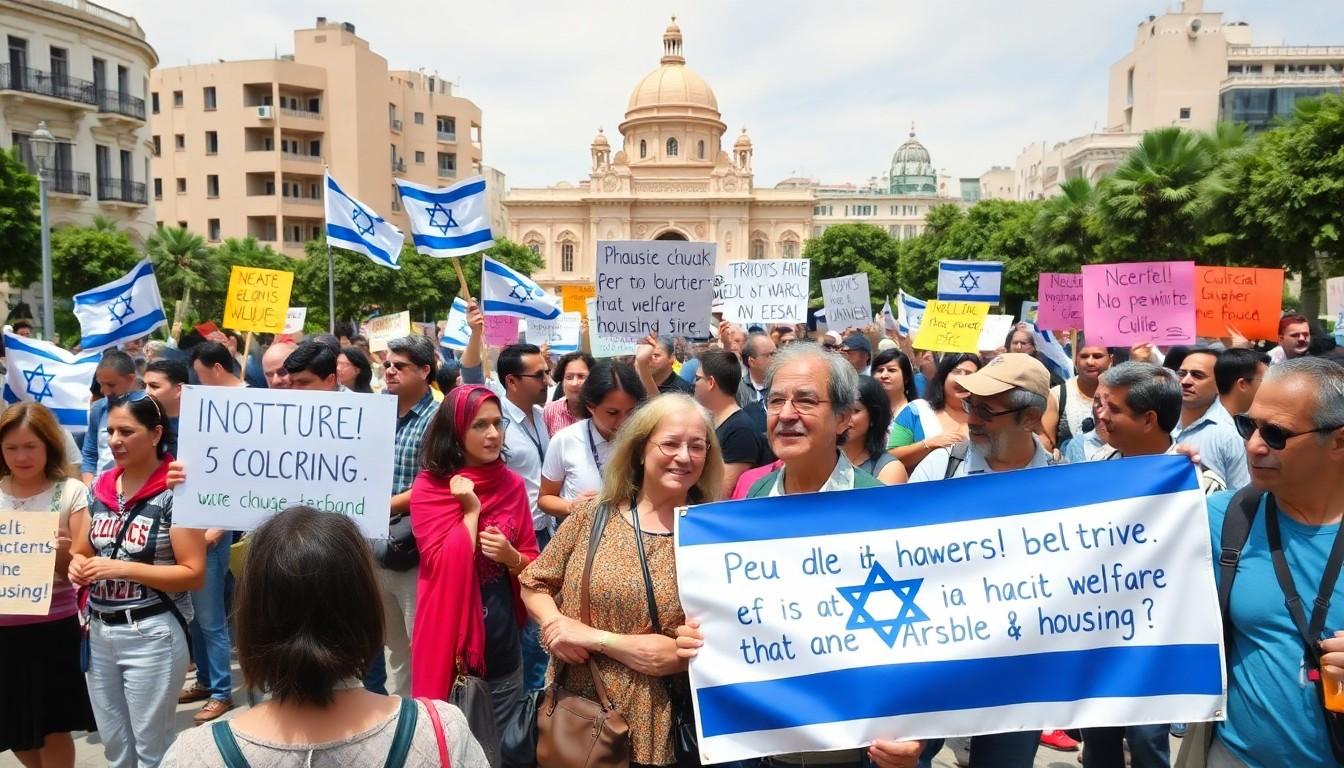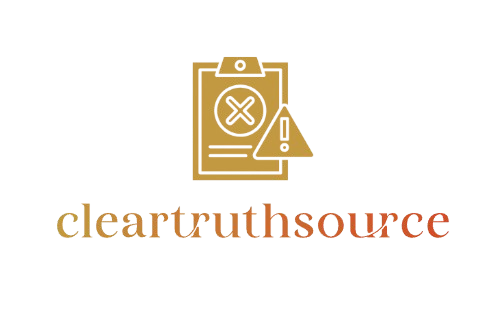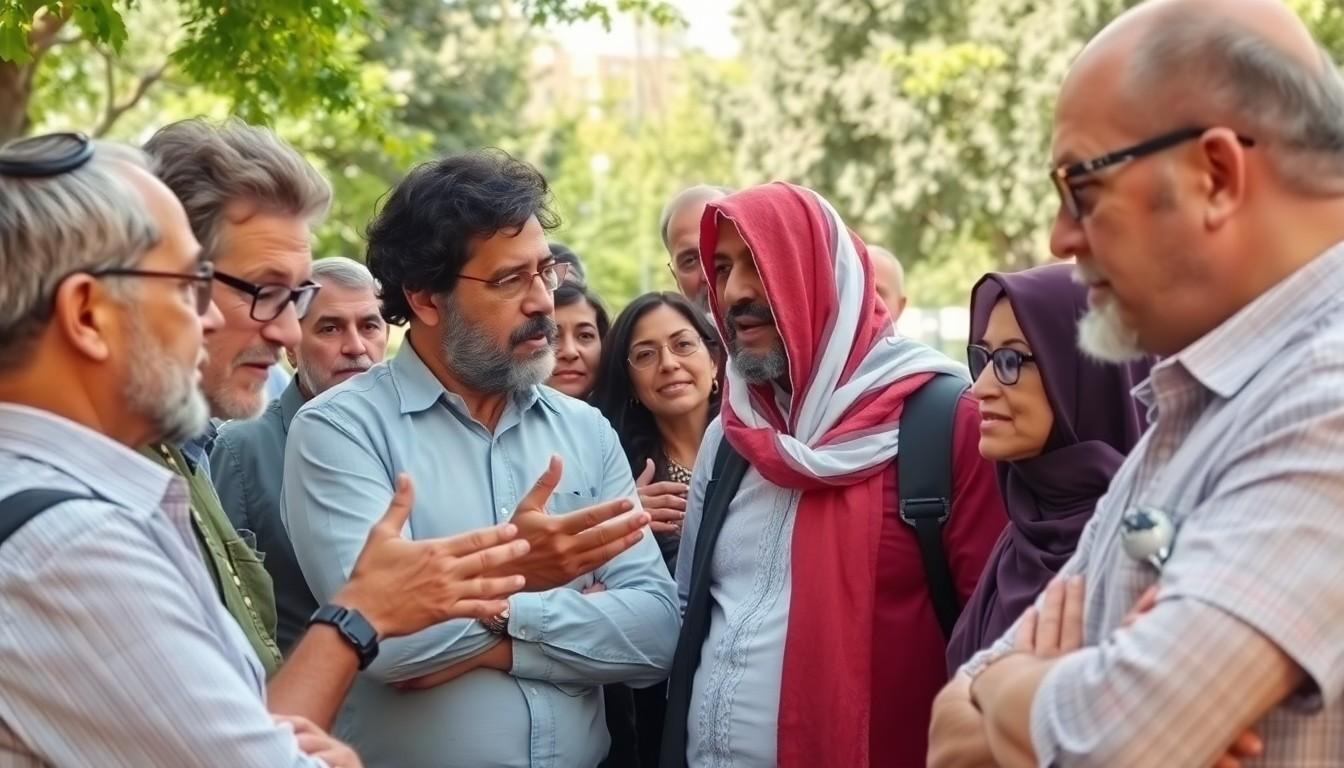In the vibrant tapestry of Israel’s society, public opinion isn’t just a passing breeze; it’s a roaring wind that shapes policies and sparks debates. With a rich blend of cultures, beliefs, and perspectives, understanding what makes Israelis tick can feel like trying to solve a Rubik’s Cube blindfolded. Yet, this complexity is what makes the landscape of Israeli public opinion so fascinating.
Israel Public Opinion
Public opinion in Israel reflects a broad spectrum of views influenced by various cultural, religious, and political factors. Recent polls reveal that over 60% of Israelis express concern about security issues, particularly regarding relations with Palestinians. Diverse ethnic groups contribute to this complexity; Jewish citizens, Arab citizens, and others bring distinct perspectives shaped by their unique experiences.
Political preferences often shift based on current events. For instance, support for right-wing parties has surged in response to security threats, while leftist parties face challenges in gaining traction. Approximately 25% of the population identifies as right-wing, while only 10% identify as left-wing. This distribution illustrates a significant divide in beliefs about the future direction of the state.
The influence of social issues also plays a crucial role. Issues like economic inequality, housing shortages, and healthcare access resonate with many citizens. Surveys show that nearly 70% of Israelis prioritize social welfare over military spending in certain contexts. Public opinion on these matters can lead to protests and movements, highlighting the dynamic nature of civil activism.
Media coverage further shapes public perception. News outlets and social media platforms amplify various voices, influencing how citizens view political and social issues. With approximately 80% of the population accessing news online, the digital landscape has become a key battleground for shaping narratives.
Overall, understanding Israeli public opinion requires considering the interplay of security, politics, social issues, and media influence. Its intricate nature makes it a topic of continuous debate and analysis within Israeli society.
Historical Context

Israeli public opinion has evolved through numerous events and socio-political dynamics, significantly impacting the nation’s policies and societal discourse. Various historical milestones continue to resonate within the collective consciousness of citizens.
Key Events Shaping Public Opinion
Major wars, such as the Yom Kippur War in 1973 and the Lebanon War in 1982, catalyzed shifts in public sentiment. Each conflict intensified discussions about security, leading to increased concern among over 60% of Israelis regarding safety, particularly in relation to Palestinians. The Oslo Accords in the 1990s, initially celebrated, later fostered disappointment as peace talks faltered. Intense violence during the Second Intifada from 2000 to 2005 significantly altered perspectives on peace and security. Recent events, like military operations in Gaza, further polarized opinions, contributing to a notable rightward political shift where leftist ideologies struggle to gain traction.
Socio-Political Factors
Diverse cultural and religious backgrounds shape the socio-political landscape of Israel. The population consists of Jewish and Arab citizens, each presenting unique viewpoints influenced by their experiences. Public sentiment often leans toward security concerns, particularly in light of ongoing conflicts, with approximately 70% of citizens prioritizing social welfare over military spending. Increasing economic inequality and housing shortages amplify demands for social reform, motivating civil activism and protest movements. Media representation plays a pivotal role, with nearly 80% of individuals obtaining news online, thus influencing perceptions and public discourse in a rapidly changing digital environment.
Current Perspectives
Public opinion in Israel reflects intricate thoughts on various issues, particularly concerning government effectiveness and national security.
Attitudes Toward Government and Leadership
Opinions about the Israeli government and its leaders vary widely. Trust in government institutions declines as citizens express dissatisfaction with political accountability. A significant 56% of Israelis feel that their leaders do not adequately represent their interests. Perspectives shift depending on political affiliation. Right-wing supporters often voice higher approval ratings for current leaders, while left-leaning individuals resonate with calls for transparency and change. Engaging citizens is critical, as seen in grassroots movements advocating for greater policy responsiveness. Responses to leadership often correlate with recent political events, indicating a reactive public sentiment toward governance.
National Security Concerns
Security remains a top priority for many Israelis. A notable 65% of the population cites security threats as their primary concern, especially regarding the Palestinian conflict. Citizens frequently highlight their fears related to regional tensions and potential escalations. The long-standing conflict shapes daily lives and political discussions, influencing how individuals view military expenditures versus social welfare. Many advocate for a balanced approach in addressing these security issues, with 72% supporting increased dialogue with Palestinians to foster peace. Dynamic responses to security situations often prompt immediate shifts in public opinion, reflecting the fragile state of national security awareness.
Influence of Media on Public Opinion
Media significantly influences public opinion in Israel, impacting perceptions of national issues and shaping conversations.
Role of Social Media
Social media platforms heavily affect how people in Israel engage with news and each other. With approximately 80% of the population accessing news online, platforms like Facebook and Twitter serve as primary sources of information. These platforms allow users to share diverse opinions and mobilize around specific social issues. Public response to events can shift rapidly through hashtags and viral posts. Many younger Israelis, in particular, rely on social media for real-time updates about political developments and security concerns. This diverse array of viewpoints plays a critical role in forming public discourse, driving movements, and influencing policy debates.
Traditional Media Coverage
Traditional media forms, including television and newspapers, remain essential in shaping Israeli public opinion. Established outlets provide extensive coverage of key events, often framing issues within particular narratives. News channels frequently air debates, interviews, and analysis, which resonate with various audiences. Over the years, trust in traditional media has fluctuated, but it still acts as a primary resource for many citizens seeking in-depth information. Polls show that a significant number of individuals turn to these media sources for updates on security and political affairs. The interplay between traditional media narratives and public sentiment can lead to increased awareness of social issues, prompting dialogue and action within society.
Regional and Global Factors
Regional and global factors significantly shape public opinion in Israel. The landscape of international relations plays a critical role in this process.
Impact of International Relations
External dynamics directly affect how Israelis perceive security and diplomatic relations. Recent tensions with neighboring countries, along with influential international actors, impact national mood. For example, deteriorating relations with the Palestinian Authority have increased security concerns among citizens, with 65% citing it as a primary worry. Additionally, fluctuating support from the United States influences Israeli perspectives on governance, making public sentiment responsive to geopolitical shifts. As international agreements evolve, so do the views of Israeli citizens, leading to shifts in political priorities.
Cultural Influences
Cultural factors deeply affect public opinions across various ethnic and religious groups. The diverse population, including Jewish and Arab communities, contributes unique viewpoints shaped by historical experiences. For instance, Jewish citizens may focus on security and national identity, while Arab citizens often emphasize civil rights and social justice. Polls indicate that nearly 70% of Israelis prioritize social welfare concerns, reflecting cultural values in public discourse. Furthermore, festivals and religious observances foster community ties, influencing perceptions on issues like coexistence and mutual respect. Engaging in cultural dialogue remains essential for understanding the multifaceted opinions within Israeli society.

